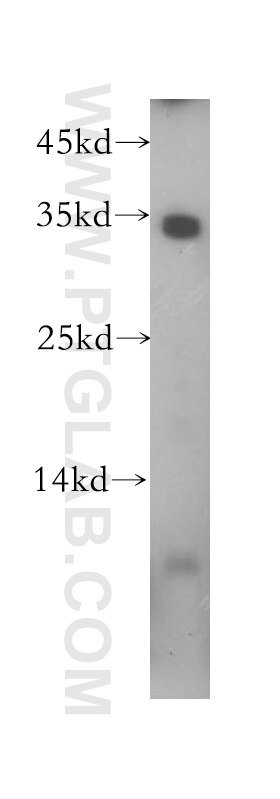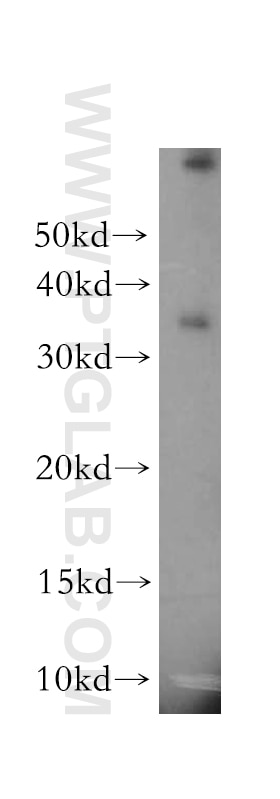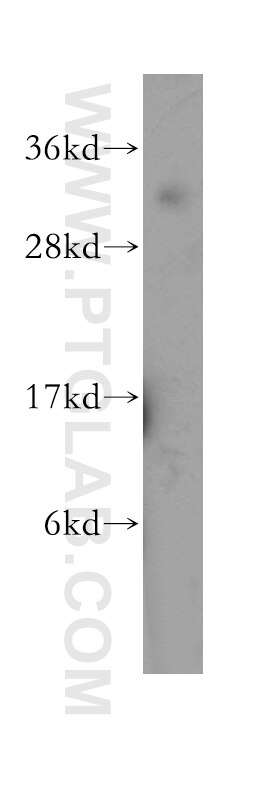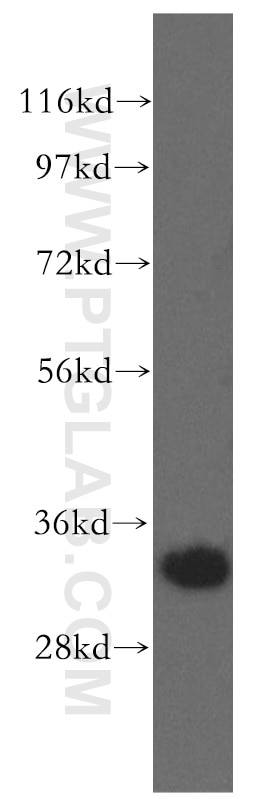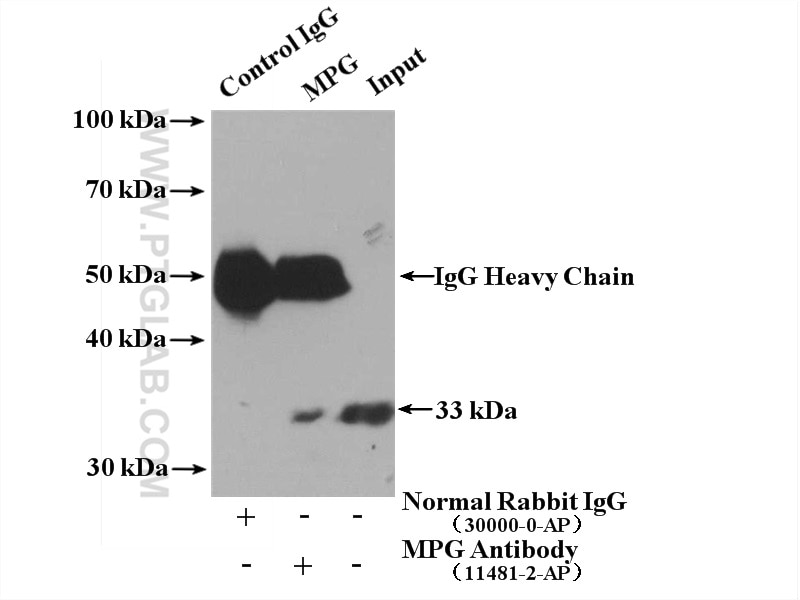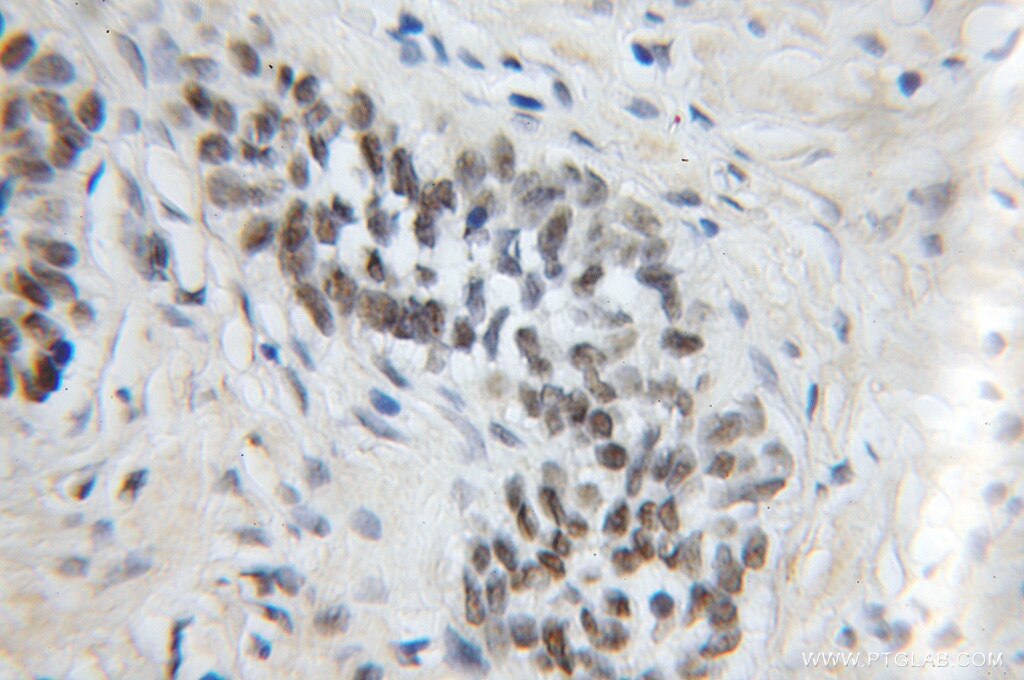Anticorps Polyclonal de lapin anti-MPG
MPG Polyclonal Antibody for WB, IP, IHC, ELISA
Hôte / Isotype
Lapin / IgG
Réactivité testée
Humain, rat, souris
Applications
WB, IP, IHC, ELISA
Conjugaison
Non conjugué
N° de cat : 11481-2-AP
Synonymes
Galerie de données de validation
Applications testées
| Résultats positifs en WB | cellules HepG2, cellules Jurkat, cellules MCF-7 |
| Résultats positifs en IP | cellules HepG2, |
| Résultats positifs en IHC | tissu de cancer de la prostate humain il est suggéré de démasquer l'antigène avec un tampon de TE buffer pH 9.0; (*) À défaut, 'le démasquage de l'antigène peut être 'effectué avec un tampon citrate pH 6,0. |
Dilution recommandée
| Application | Dilution |
|---|---|
| Western Blot (WB) | WB : 1:500-1:1000 |
| Immunoprécipitation (IP) | IP : 0.5-4.0 ug for 1.0-3.0 mg of total protein lysate |
| Immunohistochimie (IHC) | IHC : 1:20-1:200 |
| It is recommended that this reagent should be titrated in each testing system to obtain optimal results. | |
| Sample-dependent, check data in validation data gallery | |
Applications publiées
| WB | See 3 publications below |
Informations sur le produit
11481-2-AP cible MPG dans les applications de WB, IP, IHC, ELISA et montre une réactivité avec des échantillons Humain, rat, souris
| Réactivité | Humain, rat, souris |
| Réactivité citée | Humain, souris |
| Hôte / Isotype | Lapin / IgG |
| Clonalité | Polyclonal |
| Type | Anticorps |
| Immunogène | MPG Protéine recombinante Ag2034 |
| Nom complet | N-methylpurine-DNA glycosylase |
| Masse moléculaire calculée | 293 aa, 32 kDa |
| Poids moléculaire observé | 33 kDa |
| Numéro d’acquisition GenBank | BC014991 |
| Symbole du gène | MPG |
| Identification du gène (NCBI) | 4350 |
| Conjugaison | Non conjugué |
| Forme | Liquide |
| Méthode de purification | Purification par affinité contre l'antigène |
| Tampon de stockage | PBS with 0.02% sodium azide and 50% glycerol |
| Conditions de stockage | Stocker à -20°C. Stable pendant un an après l'expédition. L'aliquotage n'est pas nécessaire pour le stockage à -20oC Les 20ul contiennent 0,1% de BSA. |
Informations générales
N-methylpurine DNA glycosylase (MPG), an initiator glycosylase of the base excision repair (BER) pathway, typically repairs alkyl-induced DNA adducts, many of which are associated with genomic instability and tumorigenic risk [PMID:22801474] MPG initiates BER by removing TMZ-induced N3-methyladenine and N7-methylguanine base lesions, leaving abasic sites (AP sites) in DNA for further processing by BER [PMID:21377995]. MPG involves in modulating the genotoxic threshold response induced by the Sn2 alkylating agent ethyl methanesulfonate (EMS) [PMID:21071726].
Protocole
| Product Specific Protocols | |
|---|---|
| WB protocol for MPG antibody 11481-2-AP | Download protocol |
| IHC protocol for MPG antibody 11481-2-AP | Download protocol |
| IP protocol for MPG antibody 11481-2-AP | Download protocol |
| Standard Protocols | |
|---|---|
| Click here to view our Standard Protocols |
Publications
| Species | Application | Title |
|---|---|---|
EMBO Rep LncRNA GUARDIN suppresses cellular senescence through a LRP130-PGC1α-FOXO4-p21-dependent signaling axis. | ||
J Oncol A Novel Pseudogene Methylation Signature to Predict Temozolomide Outcome in Non-G-CIMP Glioblastomas. | ||
J Radiat Res Abundance of BER-related proteins depends on cell proliferation status and the presence of DNA polymerase β. |
